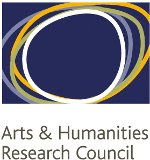Transformations of Narrative in the Postcolonia Era
Conference 11th, 12th, 13th November 2010
Proposals for papers are invited on the following themes:This will be the second in a series of three international conferences produced by the Pinter Centre as part of our AHRC-funded research project entitled
'Beyond the Linear Narrative: Fractured Narratives in Diasporic Writing and Performance in the Postcolonial Era'
Through performed papers, academic papers and workshops, the goal of the conference will be to address the central question:
'Is fracturing central to postcolonial narrativity?'
Proposals for performed and academic papers welcome.
* Is fracturing central to postcolonial narrativity?
* How has the use of non-western forms transformed aesthetics in
postcolonial writing and performance?
* Locations, Dislocations & Postcolonialisms
* Are diasporic identities the same as fractured identities?
* Narrative hybridity & heteroglossia in the global world
* Transformations of narrative in new technology
* Contesting the post- in Postcolonial [writing and performance? BP]
* Intersections of diasporas and diasporic writing
* First nation/Indigenous writing and performance and the Transformation
of narrative
* Postcolonial/postmodernism revisited
All proposals and enquiries to be sent to b.pester@gold.ac.uk
Deadline for proposals: 30th August
Deadline for papers: 30th September
More about the research project:
The AHRC is funding a three-year research project which is being led by Professor Robert Gordon as Principal Investigator, Professor Helen Carr as Research Consultant, and Professor Blake Morrison and Dr Osita Okagbue as Co-Investigators. Research will be undertaken by a number of scholars and practitioners working in the departments of Drama and English and Comparative Literature, but there will be creative and critical input from a number of other disciplines. Taking Pinter's work as a starting point for, or symbol of, the fracturing of narrative across many art-forms in twentieth and twenty-first century work, this research project asks a series of questions about the links between inter-cultural and political change and the emergence, or re-emergence, of non-linear and fractured narrative. Focussing on literature and performance, particularly in postcolonial and diasporic contexts, it will ask why non-linear narrative has been such a feature of this period's artistic production. If these fractured and experimental forms are a response to the breakdown of the west's grand narratives of progress, what forms of resistance or revision do they provide? In what ways can they be seen to emerge from the increasing interaction of different cultures in the colonial, post-colonial and post-Cold War world? How do such fractured narratives work in postcolonial and diasporic writing and performance? How can these fractured forms explore our culturally diverse society's competing and conflicting narratives?More about the Pinter Centre for Performance and Creative Writing:
The College-based Pinter Centre for Performance and Creative Writing was formally inaugurated in June 2003, with Harold Pinter as Honorary President.This is an interdisciplinary research centre, involving principally the Departments of English & Comparative Literature and of Drama, the latter organising and hosting the Centre, and with links with Media and Communications, Music, PACE and the Digital Studios.
Though he is best known as a playwright, what distinguishes Harold Pinter is his achievement in several different media – as a poet, novelist, screenwriter, dramatist for television and radio, and polemicist for freedom of expression and human rights. In keeping with this, through its projects the Pinter Centre initiates and promotes research into all aspects of the theory and practice of creative writing and performance.
In line with Pinter's keen awareness of the centrality of political issues, the Centre is particularly committed to looking at postcolonial and diasporic literature and performance, and the ways in which contemporary creativity is forging new forms that respond to the cultural diversity of the world in which we live. It also has a strong interest in questions of gender, and writing and performing the body.




No comments:
Post a Comment